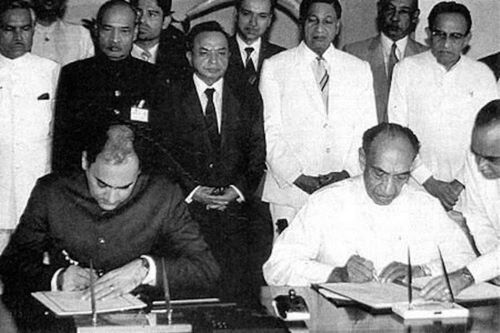Date : 8/12/2023
Relevance: GS Paper 2 – International Relations
Keywords: Indo-Lanka Accord 1987, LTTE, 13th Amendment, Multi-ethnic Society
Context-
The implementation of the 13th Amendment to the constitution of Sri Lanka, formulated in the aftermath of the historic Indo-Lanka Accord of 1987, has been a contentious issue for over three decades. Despite its enactment, various factors such as conflicting opinions among ethnic communities, political perceptions, and legal hurdles have hindered its full implementation.
Historical Background:
The roots of the ethno-political issue in Sri Lanka can be traced back to the postcolonial period, marked by the rise of Sinhalese-Buddhist nationalism. The actions of leaders who aimed to serve the interests of the majority Sinhalese community created disenchantment among minorities, particularly the Tamils. Initial attempts at addressing these issues through pacts and agreements in the 1950s and 1960s fell short of achieving federalism. The 1972 Republican Constitution further marginalized minority rights, leading to assertive Tamil discourse on nationhood and self-determination.
The turning point came in 1983 with the Anti-Tamil riots, prompting India to intervene. The Indo-Lanka Accord of 1987 recognized Sri Lanka as a multilingual, multi-ethnic society and paved the way for the 13th Amendment, which introduced devolution of powers to provinces.
What is the 13th Amendment?
Enacted on November 14, 1987, the 13th Amendment introduced several changes, including making Tamil and Sinhala official languages and English as a linking language. However, its effectiveness is marred by its integration into a rigid unitary state framework. The Governor's extensive powers, the central executive's ability to override provincial decisions, and uncertainties regarding legislative autonomy have hindered the devolution of powers to provinces.
Legal Developments and Political Aspects:
- The Provincial Councils Act of 1987 created nine provinces in Sri Lanka, merging the North and East to form the Northeast Province under the Indo-Lanka Accord.
- This sparked backlash from the Sinhala community, fearing separatism. In 1990, the Chief Minister of the Northeast province declared an independent Eelam, leading to the dissolution of the provincial council.
- Efforts to amend the 13th Amendment in 1995 and 2001 faced challenges like government consensus, Sinhalese opposition, and maximalist LTTE proposals.
- Mahinda Rajapaksa's 2005 election, supported by nationalist parties, aimed to preserve the unitary status.
- In 2006, the Supreme Court ruled the 1987 merger "invalid," pleasing Sinhala petitioners but causing despair among Tamils. Since 1988, the North and East provinces have been militarized.
Present Perspective:
In the post-LTTE era, the focus has shifted from advocating for a separate Eelam to debating the full implementation of the 13th Amendment in Sri Lanka. Tamils generally support it, while Sinhalese oppose it. The source of this demand—whether from politicians or the general populace—is a key question.
President Wickramasinghe's recent actions prompted varied responses. Opposition parties are against the 13th Amendment, and the National People’s Power parliamentarian questions its sustainability. Some Buddhist clergy expressed strong opposition by burning a copy near Parliament. The Tamil community welcomes the President's commitment, but political parties are cautious due to past experiences.
The Aragalaya struggle raised concerns about the military's role in civil affairs, with discussions mainly focusing on the military budget rather than addressing the militarization of the North and East. This suggests a lack of Sinhalese inclination towards political autonomy for these provinces.
President Wickramasinghe, in his Independence Day address, affirmed adherence to a unitary state, opposing a federal state but supporting power devolution to provinces. His interest in the 13th Amendment is influenced by factors like a UNHRC resolution, regaining benefits from the EU's GSP+, and pressure from the Sri Lankan Tamil diaspora, which contributes substantial remittances.
Indian Concern:
The Indian government consistently rejects secessionism in Sri Lanka, emphasizing a political reconciliation process for the ethnic issue within a united Sri Lanka. Despite India's commitment to a negotiated solution aligning with democratic principles, some view it as a "big brotherly attitude."
The strong "People to People" connection between India and Sri Lanka, especially with 15% of the Tamil population in Sri Lanka, is reinforced by cultural agreements and initiatives like the Jaffna Cultural Centre. Pilgrim trails such as Rāmāyaṇa Trails are celebrated, and India offers scholarships to Sri Lankan students.
President Wickramasinghe highlighted Sri Lanka's neutrality and commitment to preventing its use against India in an interview with France 24. India strategically engages with Sri Lanka amid concerns about China-Sri Lanka engagement, notably in the Hambantota port. Wickramasinghe's visit to India in July 2023 resulted in optimistic projects.
Prime Minister Modi has prioritized the aspirations of Tamil-speaking people in Sri Lanka and stressed the full implementation of the 13th amendment. India emphasizes its significance for addressing domestic and spillover issues, including displaced migrants and fishermen.
Conclusion
President Ranil Wickramasinghe's proactive measures, including All Party Conferences and discussions on the National Reconciliation Program and North-East Development, provide hope for Tamil aspirations. The focus should not solely be on fully implementing the amendment, given its limitations, but rather on addressing the problem. Crucially, engaging civil societies in discussions, prioritizing their needs over political party conferences, is essential.
President Wickramasinghe emphasized in Parliament that a thriving provincial council system holds the potential for a significant overall transformation. Despite ongoing economic reconstruction programs in Sri Lanka, true prosperity and admiration as a nation can only be achieved by fulfilling the aspirations of the people. This necessitates complete demilitarization in the northern and eastern provinces, full devolution of police, land, and education powers, conducting elections, and allocating sufficient funds to these regions.
Probable Questions for UPSC mains Exam-
- Examine the controversies surrounding the 13th Amendment in Sri Lanka. Discuss the historical background, key provisions, and challenges to its implementation, with a focus on the role of President Ranil Wickramasinghe's initiatives. (15 marks, 250 words)
- Evaluate India's role in addressing the Sri Lankan ethnic issue, emphasizing the 13th Amendment. Assess the impact of cultural and strategic ties, and analyze the implications of recent development in this regard. ( 10 marks, 150 words)
Source- Indian Express







